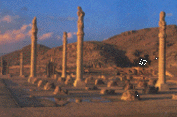
   |

History Truths...
بحرين
بحرين را مصدق بباد داد.....
وقتی به تهران خبر رسيد که انگليسی ها بحرين را اشغال کرده اند مجلس به موضوع
علاقمندی نشان داد و جلسه سری در مجلس شورای ملی به خاطر واقعه بحرين تشکيل شد اگر
چه جزئيات مذاکرات جلسه سری مجلس شورای ملی در دست نيست ولی يک امر مسلم است که رضا
خان سردار سپه (دقت کنيد در اينجا رضا خان فقط يک سردار سپاه است و دخالتی در امور
دولت و مقام سلطنتی ندارد) از آن تصميم نابخردانه سخت برآشفت و حتا شايع است که در
آن جلسه از فرط عصبانيت و تاسف گريسته است.
ملک الشعراء بهار در دوران نخست وزيری مشيرالدوله وقتی مصدق وزير امور خارجه بوده
نوشته است:
«زمانی که مشير الدوله نخست وزير و مصدق السلطنه وزير امور خارجه بود و انگليس هم
اوضاع را بر وقق مراد خود می ديد چنين استنباط می شود که ايادی انگلستان مصدر کارند
و انگلستان نمی خواهد اين فرصت طلائی را در تصرف بحرين آنهم بدون زحمت وبدون اعتراض
کشورهای استعمارگر ديگر از دست بدهد ولذا قسمتی از خاک ايران را به تصرف خود در
آورد»
بنا به گفته ملک الشعرا بهار آقای مصدق السلطنه و مشير
الدوله از ايادی انگلستان به حساب می آمده و شاهديم که مصدق در
مقام وزير خارجه در اين باره کوچکترين اقدامی نمی کند. تا بجائی که
سردار سپه را به آن درجه از عصبانيت می رساند که در مجلس به گريه
می افتد. حتا نمی بينيم که مصدق مسئله بحرين را به مجلس شورايملی و
يا به وزارت کشور ويا يا جای ديگری گزارش کرده باشد. ولی برای خود
شيرينی گويا نامه ای به سفارت انگليس نوشته و
خواستار حفظ جان و مال اهالی «بحرين» شده است. اين چنين نامه ای
بدون هرگونه اشاره به اعتراض دولت ايران در واقع ورود انگلستان به
بحرين را تائيد و سند اجازه را صادر فرموده اند.
اين کار مصدق بدون مشورت و بدون ارتباط با جلسه سری مجلس شورای ملی
بوده و پيش از آگاهی مجلس از جريان اشغال انگلستان بوده است.
در اسناد وزارت خارجه انگلستان آمده است که يک کشتی حامل چهل سرباز هندی و دو اراده
توپ متعلق به «دولت فخيمه» به بحرين پياده شده اند و بدون هرگونه درگيری بحرين در
اختيار انگلستان قرار گرفته است. از آن به بعد دولت ايران هرگونه اختيار در مورد
بحرين را از دست داده است و اين جزيره که به مرواريد خليج پارس مشهور است تحت سلطه
انگلستان در آمده است. کار های کليدی و مهم کشوری و لشگری بحرين در اختيار انگلستان
بوده است.
وقتی کار های مملکت در دست افرادی مثل "عامل انگلستان" مصدق باشددريک فرصت مناسب
اين چنين خيانتی را به بار می آورد.
در اين مقطع زمانی نيروی دريائی و ارتش ايران نيروی قابل ملاحظه ای را در خليج پارس
تشکيل نمی داد. فقط دو کشتی نسبتا کوچک بنام «پرسپوليس» و «مظفری» درخليج پارس بود
که انگليسی ها آندو را هم تا شهريور 1320 غرق کردند.
اگر وزارت خارجه دولت مشيرالدوله با سرپرستی محمد مصدق به موقع عمل می کرد شايد می
شد به موقع پيش از ورود ناوگان انگلستان به بحرين به کمک آن دو کشتی دو اراده توپ،
تعدادی سرباز در بحرين پياده نمود و با لوازم و ادوات زمينی و دريائی و با درايت و
از جان گذشتگی سردار سپه جلوی ورود انگلستان را گرفت. ولی اين مسئله برای مصدق چنان
بی اهميت بود که هرگز حرکت های انگلستان را باوجود اينکه نامه ای هم سرخود و بدون
مشورت با هيئت دولت به سفارت انگلستان می نويسد مطرح نمی کند و هيات دولت، مرزبانی،
نيروی دريائی، و ارتش و وزارت کشور را از اقدام شرورانه انگلستان باخبر نمی کند.
ولی مصدق چون در پی حفظ «وجاهت ملی» است مدعی میشود انگليس دشمن او بوده است بجای اينکه تلگراف دولت
انگلستان را به مجلس بفرستد و موضوع را با وزارت کشور و وزارت جنگ و هيئت دولت مطرح
کند وراه حل بخواهد خود سرانه بنا به سوگندی که درهنگام عضويت در جامع آدميت که توسط
سرجان ملکم ارمنی نوکر انگلستان خورده بود همواره «مادام العمر در حفظ منافع دولت
فخيمه انگلستان کوشا» می ماند و اين خيانت بزرگ را به ايران وايرانی روا ميدارد. او
اختيار بحرين رادردوران حکومت قاجار ودر دوران رئيس الوزرائی مشير الدوله به
انگلستان واگذار می کند.
ملک الشعرا که چشم ديدن رضا شاه را نداشت معهذا می نويسد موضوع بحرين نقطه عطقی در
زندگی سياسی رضا خان سردار سپه بشمار می آيد او که برای باز پس گيری يک تکه زمين
خشک و بی حاصل جان خود و سربازانش را به خطر انداخته بود و تا کام مرگ پيش رفته بود
چطور می توانست اين فاجعه عظیم را تحمل کند؟ او در هيئت دولت عصبانی می شود و
بالاخره به رئيس دولت مشير الدوله پيغام می دهد مگر در هيئت دولت ظاهر نشود والا
فلان و فلان خواهد شد. مشيرالدوله از ترس رضا خان سردار سپه استعفا می دهد. ايرج
ميرزا شعری سروده است:
تجارت نيست، صنعت نيست، ره نيست اميدی جز به سردار سپه نيست
ماجرا از آن جا آغاز می شود که روز 20 ارديبهشت 1302 در ساعت 9 صبح هنگام خريد و
فروش يک قاب ساعت بغلی بين يک عرب نجدی وهابی و يک ايرانی نزاعی رخ می دهد و منتهی
به زد و خورد می شود. ايرانيان بی خيال به گمان اينکه قضيه ختم شده است غفلت می
کنند ولی اعراب نجدی بنا به کينه و شرارت ذاتی که دارند به اشاره انگلستان مسلح شده
غفلتا برايرانيان می تازند ساعتی زدو خورد ادامه میابد و چون ايرانيان غير مسلح
بوده اند اعراب تعدادی از آنان را کشته و تعدادی را زخمی و 6 تن ايرانی هم مفقود می شوند
در پی آن به خانه های خود ميروند و مغازه ها بسته می شود.
در اين هنگامه کابينه مستوفی الممالک سقوط ومشيرالدوله بر سر کار می آيد. چون مثل
مستوفی الممالک به روس ها اتکائی نداشت و بيشتر جانب انگلستان را می گرفت بنظر می
رسد که فشار انگلستان به ايران خاتمه يابد.
مشيرالدوله مصدق را به وزارت خارجه منصوب می کند بنابراين سليمان ميرزا که طرفدار
روس ها است در مجلس در اقليت قرار میگيرد. انگليس که از زمان بيرون رفتن پرتغالی ها
از خليج پارس خود را قداره بند خليج پارس می دانست در پی آن بود که اختيار کامل
جزيره بحرين را بدست آورد. انگلستان که با بروی کار آمدن مصدق و مشيرالدوله که هردو
آنگلوفيل و از فاميل فرمانفرما بودند، اوضاع را بروفق مرادش می بيند برای اجرای طرح
به تحريک اعراب می پردازد و جنگ نيمه تمام سر ساعت بغلی را به مسئله شيعه و سنی
مبدل می کند ودر اين درگيری هشت نفر مرد و دو زن هم کشته می شوند و لذا دايه مهربان
تر از مادر يعنی دولت فخيمه انگلستان ايرانيان را تشويق می کند به کنسولگريشان در
منامه مراجعه کنند و آنان درمقام خيرخواهی از طرف نمايندگان منتخب شيعيان بحرين به
دولت ايران تلگراف می زنند که اگر دولت علاج فوری نکند تمام ايرانيان را خطر جدی
تهديد می کند. اينجا است که تير سياست اختلاف بيانداز و حکومت کن انگلستان به هدف
می نشيند ومصدق به اشاره مشيرالدوله از انگلستان تقاضای کمک می کندو اين همان چيزی
بود که انگلستان در پی آن بود و و مترصد و آماده اشغال بحرين بود. بدون زحمت و بدون
اعتراض و بدون هرنوع خونريزی از دماغ يک سرباز هندی که به انگلستان خدمت می کرد
وارد بحرين می شود. و حتا دول عضو مجمع اتفاق ملل (آن زمان سازمان ملل خوانده نمی
شد) به اين امر اعتراضی نمی کنند زيرا به خواست وزير خارجه جناب مصدق السلطنه و
جناب مشيرالدوله انجام پذيرفته است.
اين اشغال از سوی انگلستان همچنان باقی می ماند تاروزی که در پی کنکاش فراوان و
اصرار دولت شاهنشاهی ايران در سال های 1970 بدنبال مطرح شدن مسائل مربوط به جزائر سه
گانه تاکيد می روزد تا انگلستان آب های خليج پارس را ترک کند. چون هنوز بحرين
دراشغال انگلستان بود در آنجا با نظر سازمان ملل متحد رفراندمی صورت گرفته و مردم
به آزادی بحرين رای می دهند.
خلافکاری مصدق و مستقر کردن انگليس در همسايگی ايران توسط مصدق السلطنه «وجيه
المله» با زحمت زياد و مذاکرات و جلسات طولانی، سالها بحث و گفتگو و هزينه بسيار
سنگين به طريقی حل می شود ولی هرگز بحرين به خاک ايران متصل نمی شود.
در همين دوران در سرتاسر دوران پادشاهی پهلوی به دليل يک اشتباه عمدی از سوی مصدق،
ايران در يک جنگ سرد با انگلستان روبرو می شود. هرگاه مجلس ايران تشکيل می شد يک
صندلی خالی در مجلس برای بحرين گذاشته می شد ولی عملا از قرن 15 به بعد که پرتغالی
ها و سپس انگلُيس در خليج پارس حضور نظامی و سياسی داشت هرگز ايران يک دکه دولتی
ويا يک سرباز يا پاسبان در بحرين نداشته است.
جبهه ملی، توده ای ها، ملی مذهبی ها و کسانی که درخدمت «استخوان های خشک و پوسيده
مصدق السلطنه» نماز جماعت می خوانند و جز فحاشی و درنده خوئی و گشاده دهنی سندی
برای ارائه ندارند وهرگاه سندی از آنها خواسته می شود دست به فحاشی ويا سفسطه می
زنند با بی شرمی برای روپوشانی و زير فرش فرستادن کثافت های مشيرالدوله و مصدق
السلطنه مساله بحرين را به دوران پهلوی و جدا شدن آنرا بی عرضگی مقامات دولت
شاهنشاهی می دانند. درحاليکه اين تخم لق بدست مصدق و مشير الدوله کاشته می شود.
اسناد مربوط به اين فجايع تاريخی موجود و قابل ارائه است.
ح-ک
مه شيد آريائی، 27 جولای 2008
7 امرتات 2547
تاریخ در اختيار مردم عادی نيست و تاريخ خود بهترين پاسخ ياوه سرائی و يک دندگی مورد برخی مغرضين است. آنچه در اينجا می خوانيد مستند بر اسنادی است که درجلد
يازدهم کتابی بنام "دائره المعارف اسلامی" در دوران جمهوری اسلامی بچاپ رسيده و
کتاب فروشی های ايران موجود است. توجه داشته باشيد که منابع آن از کتاب هائی
برداشته شده است که با دوران پهلوی و محمد رضا شاه روی خوش نداشتند و با اقدامات او
موافق نبوده اند. ولی گمان می کنم خواننده ريز بين و پژوهنده را به اندازه کافی
قانع خواهد کرد تاريخ بحرين چگونه بوده است.
پيش وارد شدن به مراتب تاريخی لازم ميداند متنی را به اين اسناد اضافه نمايد تا
مطلب گذرائی که در دوران سال های 1300 تا 1302 در دوران حکومت مشير الدوله و وزارت
خارجه مصدق گذشته پر شده باشد.
اسناد مربوط به اين فجايع تاريخی موجود و قابل ارائه است.
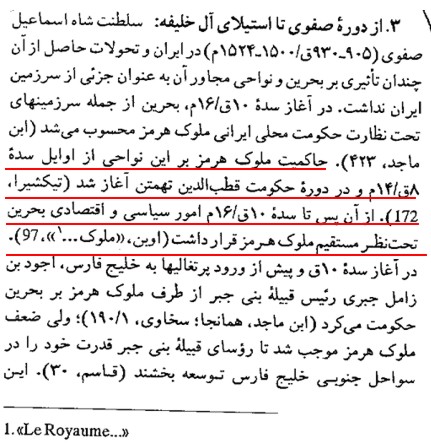
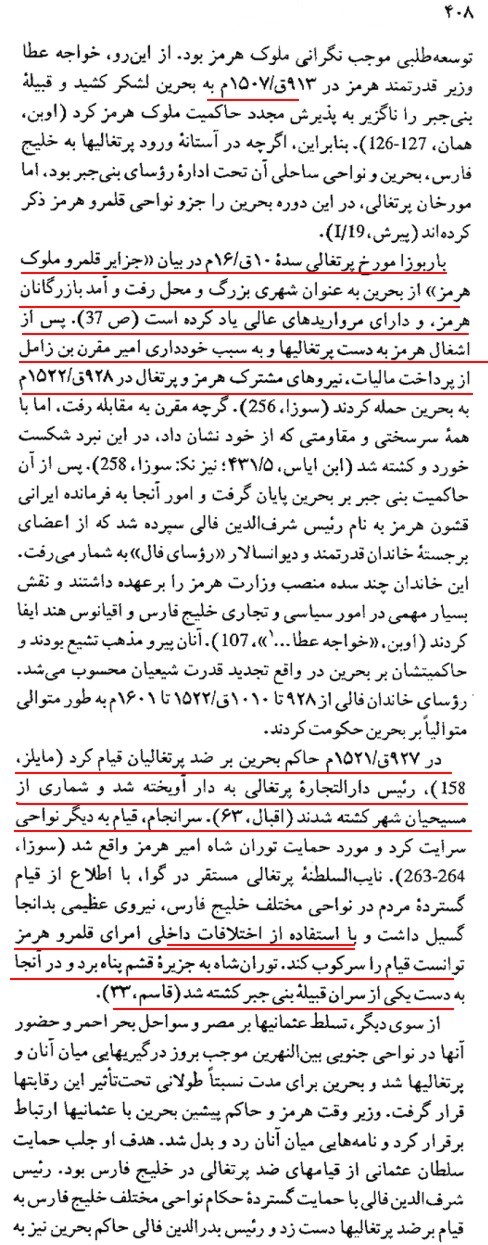
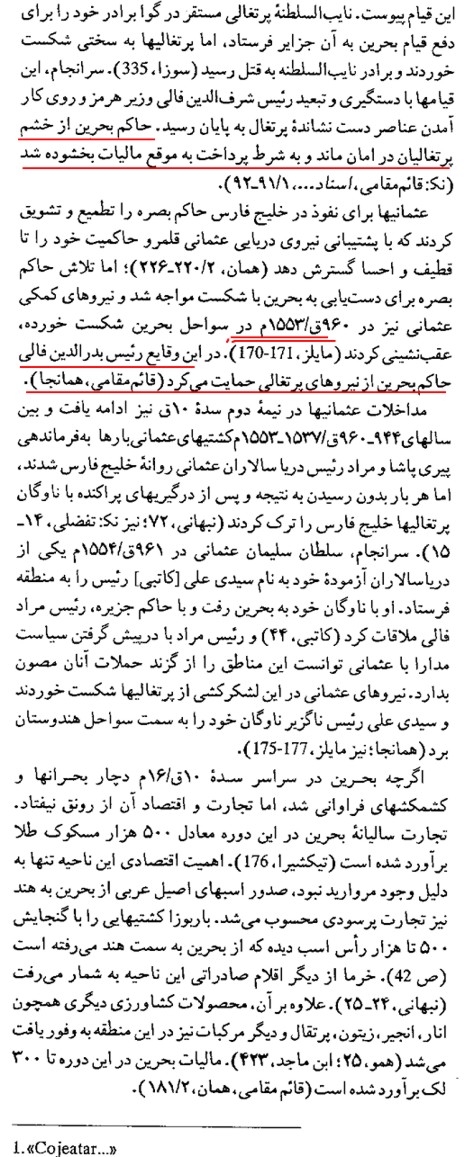
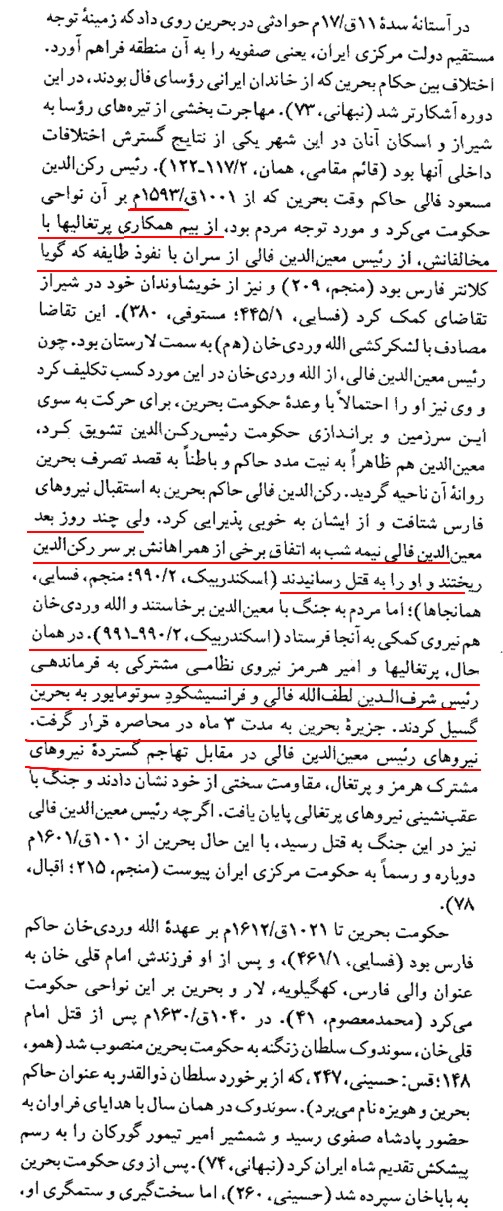
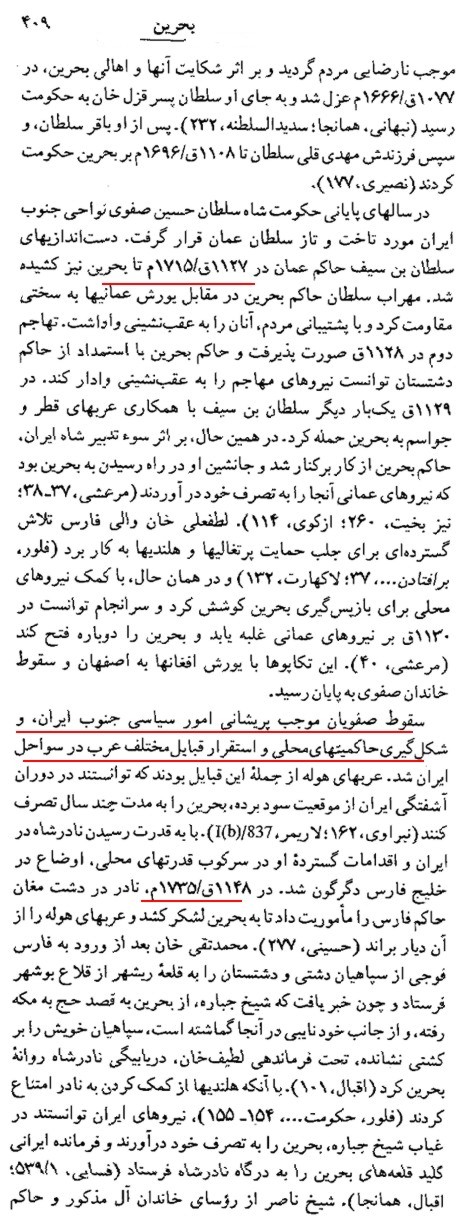
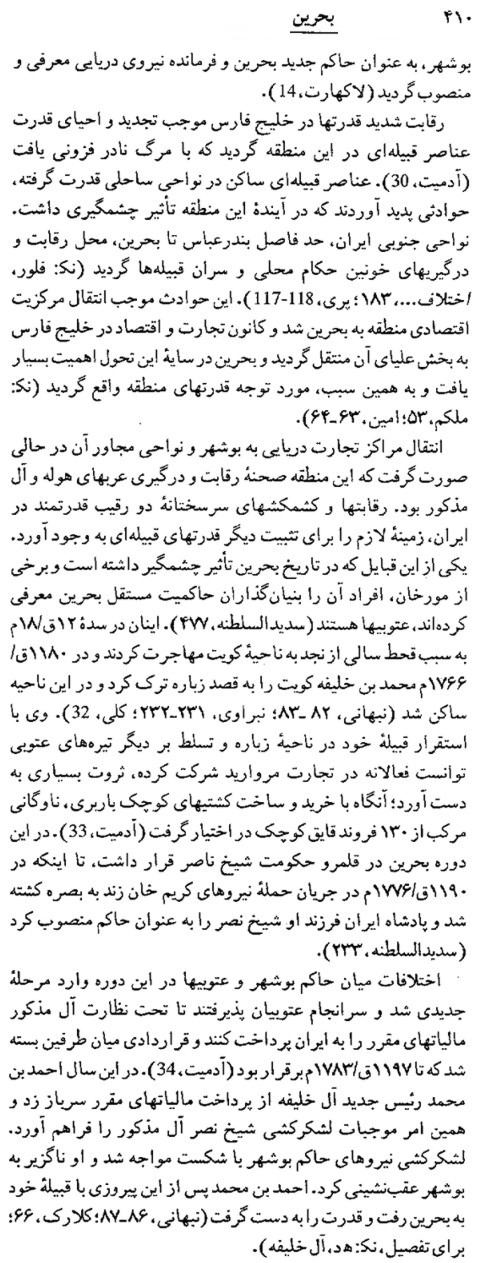
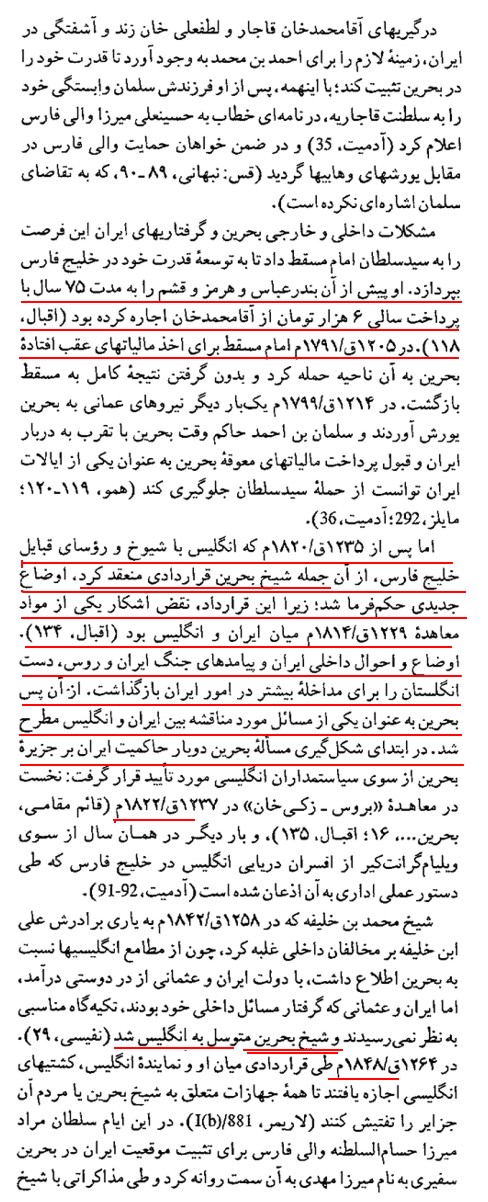
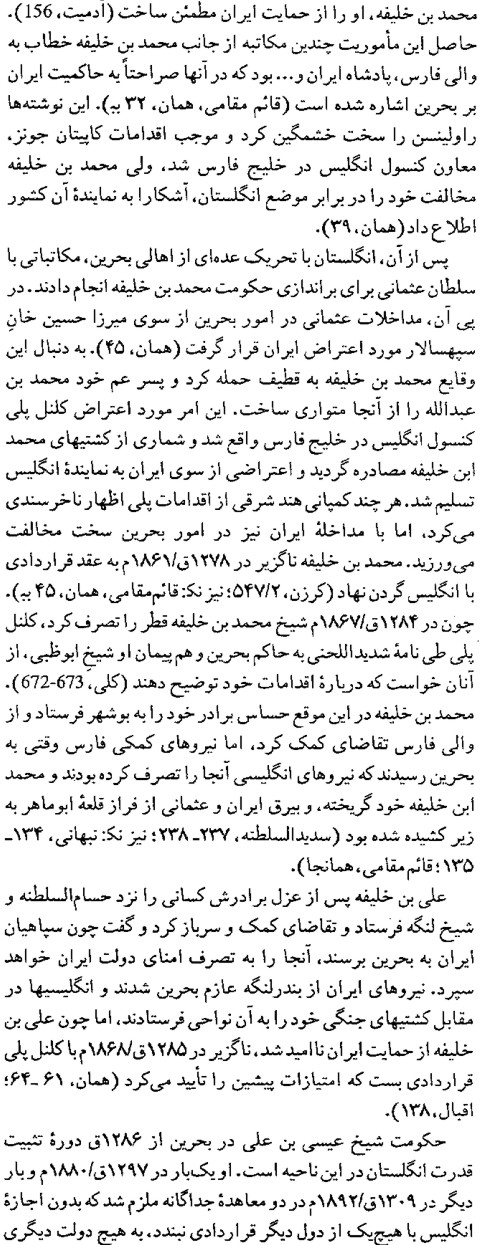
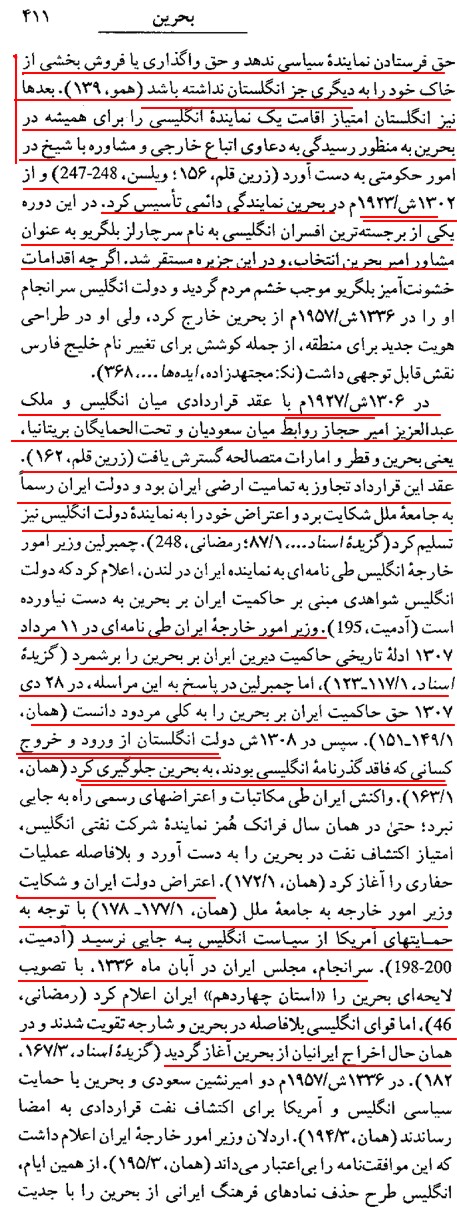
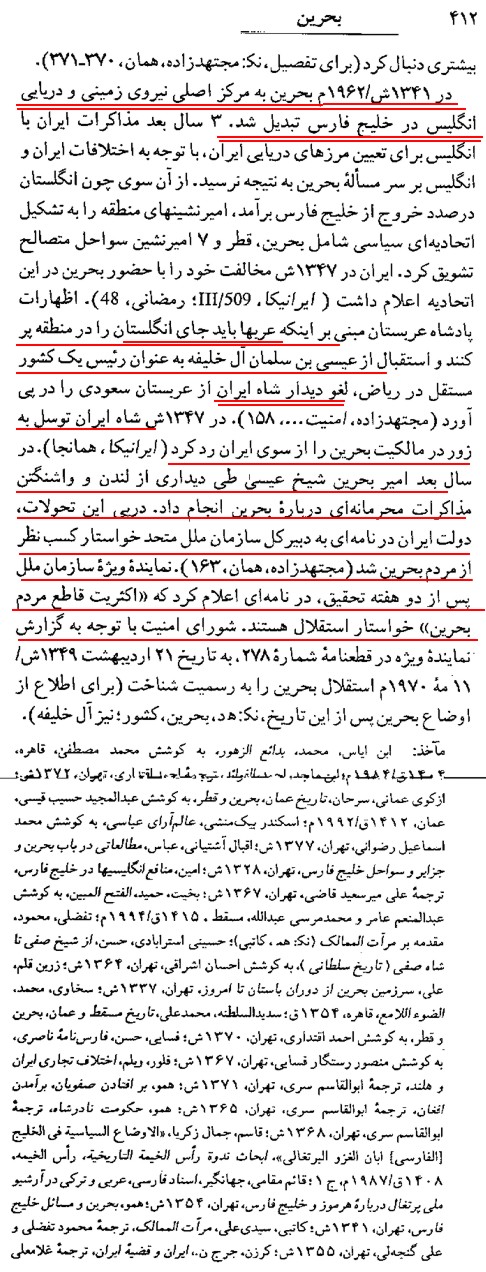
MISHMAeHIG ISLANDS (Bahrain)
"How Was separated from Iran?"
The following summary about Bahrain is
based on extracts and translated from the article “Bahrain: the land of
political movements”, by Dr. Piruz Mojtahedzadeh, published in Rahavard, a
Persian Journal of Iranian Studies, CA, USA VOL.XI, NO.39, 1995.
The past civilization of the Bahrain Islands goes back into the depth of
history, where “Dilmun culture” thrived two thousands years before Common era.
The British interference* and the implementation of politics of
“Depersonalization of the Persian Gulf”
The mediation by Sultan Hasan, the king of
Morocco repatriated the relationship between Iran and Saudi Arabia.
موقعيت بحرين برای ايران همانقدر حياتی بود که جزائر کوچک ديگر مثل
تنب کوچک، تنب بزرگ، سيری، ابو موسی و غيره ولی جزائر تنب
کوچک و بزرگ و ابو موسی که تا زمان برقراری يک رفراندم که از سوی
انگليس و ايران به سازمان ملل متحد پيشنهاد شد کاملا در اختيار
انگليسی ها بود و وقتی ميخواست از منطقه خارج شود می خواست آنها را
در اختيار شارجه و امارات خليج پارس قرار دهد. در آن زمان شارجه و
امارات ديگر تحت قيموميت و کنترل کامل انگليس بود و اينهم يک
تاکتيک سياسی بود تا مردم بحرين و دولت ايران را گول بزند.
با برخی تاريخ ها در متن پارسی و انگليسی ممکن
است دقيقا مطابق نباشد دليل آن محاسبه هائی است که يک نويسنده انگلطسی و پارسی
هنگام تبديل تاريخ انجام می دهند
Dr. P. Mojtahedzadeh is a senior research member of Center for Geopolitics and
International Borders studies in University of London, and the Chairman of Board
of Directors of the UROSOEC Research Foundation, London.
Brief
introduction to Mishmāhig Island, the present country known as Bahrain
Mishmahig is a peninsular located in the southern half of the middle section of
the Persian Gulf, which consist of 33 big and small islands. The total areas of
these islands are 637 Square Kilometers. Population of Mishmahig is estimated to
be half a million. The Shiite population is estimated to be of 70% to 75%b of
the total, who most of them are from the “Bahaareyneh-gaan”; the decedents of
Iranian origin population of the ancient Bahrain
The Ancient history:
At the time of second Iranian Empire, the Achaemenids, this land was on the
fringe of Iranian territory and when the forth dynasty, the Sasanian Empire was
achieving its peak, the encroachment of the Arabs into the Iranian dominion of
the southern Persian Gulf started. Shapur I took his forces to Mishmāhig and the
southern coasts of the Persian Gulf and expelled the alien aggressors.
When Shapour II was only a child, the Arab incursion into the southern coasts of
Iranian territory was mounted. As soon as Shapour II grew up, he decided to once
and for all cut their hands off Mishmāhig and other Iranian territories of the
southern coasts of the Persian Gulf forever. To implement such a decision
required a hard and unforgettable punishment for the invaders. He sent his army
to the region and pushed Arabs out of Iranian territories into the depth of
Arabia and restored the security of the Persian Gulf.
What is evident is that the maritime and costal of Bahrain were part of Iranian
territory from the beginning of Sasanian Empire until throughout of Iran was
occupied by the Arabs Islamic forces and migration of Bedouins from Arabian
deserts into southern Iranian territories started.
Buyyid dynasty, freed and reunited much of the country including Mishmāhig
Islands, after controlling Abbasid caliphs at Baghdad, in Iranian province of
Khavārvarān (today known as Iraq), and was part of Iranian realm until 1522 when
Portuguese invaded the Island and overthrown the Governor called Jaboor.
By In 1602 at the time of soaring power of Safavid dynasty, Iranian forces
defeated Portuguese in ports and islands of Hormoz and expelled them from
Mishmāhig and reunited the islands with the mainland Iran once again.
During this period Mishmāhig was administered by the tribes of Iranian origin of
“Havāleh” in Zebāreh In northern of Qatar Peninsula, when Zebareh was herself
under the rule of Government of Fars. Towards the end of Safavid periods though
Zebareh Government was ruled namely by Iran, but mostly it was an obstinate and
inattentive Government to the center.
In 1737, when eradication of the local obstinacy was at its apogee, Lotf Ali
Khan-e Zand was made in charge by Nāder Shah of Afshār dynasty to suppress the
rogue ruler of Zebareh. From that time Mishmāhig was under the direct rule of
Government of Fars and it was the Sheikh Naser Khan, the last Iranian ruler who
on behalf of Karim Khan-e Zand the founder of Zandian dynasty would administer
the affairs of Zebareh and Mishmāhig.
Modern history:
When Al-Khalifeh of Ban Atebeh of the Arabs entered Zebareh in 1765
political history of Mishmāhig and later Bahrain began a new period.
It did not take long that he planned to rule Zebareh and Bahrain. Sheikh Naser
Khan decided while punishing Bani-havaleh, to put Al Khalifeh in his place. He
surrounded Zabaerh but was defeated heavily.
Bahrain in 1783 at the time of ruling of Karim Khan of Zandian dynasty fell into
hands of Al Khalifeh and the rule of Iran over these islands was once again
stopped. <
Al Khalifeh since then was afflicted from encroachment and onslaught from
different forces. Vahhābis, Masghatian, Ottoman Turks and finally the English;
each one attempted on a few occasions to annex Bahrain to their Dominion.
In 1830 Sheikh Abdul Al Khalifeh declared dependence to the Iranian
Government as the Egyptian Mohammad Pasha who took away Arabian Peninsula from
Vahhabis on behalf of the Ottoman Empire wanted to know if the people of Bahrain
are not in allegiance with Iran, they would ruled by him.
In 1860 the Government of Al Khalifeh repeated the same assertion when
the British were trying to overpower Bahrain.
Sheikh Mohammad Ben Khalifeh at that time wrote a letter to Nasseredian
Shah declaring himself and his brother and all of members of Al Khalifeh and the
people of Bahrain to be of Iranian subjects, and in another letter to the
Iranian Foreign Minster, Sheikh Mohammad demanded from the Government of Iran to
be directly guided and protected in the face of British pressure.
Later on, when the pressure of Colonel Sir Lewis Pelly increased on Al Khalifeh,
Sheikh Mohammad requested military assistance from Iran, but the Government of
Iran at that time did not had the ability to protect Bahrain from the British
aggression. Therefore, the Government of British India eventually overpowered
Bahrain and Colonel Pelly in
May 1861 signed an agreement with Sheikh
Mohammad and later with his brother Sheikh Ali that placed Bahrain under British
rule and protection.
When the British forces galloped in Bahrain, they noticed that Sheikh Mohammad
ben Khalifeh had hoisted Iranian Flags all over Bahrain’s towers and forts. The
British representatives in 1868 signed another agreement with the rulers of Al
Khalifeh to the effect Bahrain joined the British protectorate territories in
the Persian Gulf.
Other agreements of 1880 and 1892 completed ultimately the protectorate status
of Bahrain to the British.
So Bahrain, which was practically
separated from Iran in 1783 but would namely confirm her allegiance to Iran, was
practically, namely and officially separated from Iran between the years of 1868
and 1892 for the last time.
The unrest of people of Bahrain in fact began when the
Britain colonialism officially established her ultimate and complete dominance
over this territory in 1892.
The first revolt and widespread uprising
took place in the month of March 1895 against Sheikh Essa Ben Ali the then ruler
of Al Khalifeh. Sheikh Essa was the first ruler of Al Khalifeh who was ruling on
that land without any relations with Iran.
SIR Arnold Wilson, the political representative of Britain in The
Persian Gulf (the writer of book” The Persian Gulf”), arrived in Bahrain from
Masghat at this time. The extent of this uprising developed further and
some of the protesters were killed by the British forces.
In 1911 a group of merchants of Bahrain, demanded the restriction of the British
influence in Bahrain. The leaders of this movement were arrested and
exiled to India.
In 1923 the British deposed Sheikh Issa Ben Ali with accused of opposing Britain
and set up a permanent representative in Bahrain. This coincided with renewal of
Iran` claim over the ownership of Bahrain and Sheikh Essa had been accused of
welcoming this development. Also the attachment shown by the People of Bahrain
towards the renewal of ownership’s claim by Iran caused concern for Britain.
To remedy these problems, Britain dispatched
one of the most experienced colonial officers, Sir Charles Belgrave as an
advisor to the Emir of Bahrain in 1926. His harsh measures caused to intensify
the increasing aversion of people towards him and resulted eventually in his
expulsion from Bahrain in 1957. Belgrave’s colonial undertakings were not
limited to the violent deeds against the people of Bahrain but a series of
dastardly initiatives, which included deiranization of Bahrain and The Persian
Gulf, and the he proposal to change the name of Persian Gulf in 1937 which did
not take place but carried out by Abdul Karim Ghasim, the dictator of Baghdad.
In 1927 Reza Shah in a letter to the Allied Nations Community demanded the
return of Bahrain. Britain knew well that her weakened domination over Bahrain
would be equal to loose control all over the Persian Gulf, decided to bring
under control at any cost the uprisings of people of Bahrain. To achieve this
the British elements encouraged conflicts between Shiite and Sunni in Bahrain.
The Iranian tendency in the uprising of this
period was to such an extent that forced the Members of Parliament of Iran to
pass a bill in the November of 1957, to the effect to announce Bahrain as the
Fourteenth province of Iran, and two empty seats were considered for the
representatives of this province.
This action was detrimental for Iran as it caused numerous problems in the
international relations, specially with some United Nations bodies, Britain,
Saudi Arabia, and numbers of Arab countries and provided a big excuse for Iraqi
extremist to extent anti Iranian campaign in the region. This action was against
the people of Bahrain as not only caused an increase sense of precaution of
Britain and the Government of Bahrain towards the Iranian connection of
Bahrain’s people uprisings, but forced the freedom loving people of Bahrain from
expressing any Iranian tendency in order to avoid accusation o f dependency to
“the expansionist policies of Iran in the Persian Gulf”, which at time was being
propagated intensely against her deserving rights in the Persian Gulf.
At this time, Britain carried out the dastardly cogitation to change the
demographic face of Bahrain.
This policy of “Deiranization” in Bahrain consisted of importing a large number
of different Arabs and others from British colonies as laborers into Bahrain. At
the same time it is noteworthy that the demonstrations of year 1956 forced the
rulers of Al Khalifeh to leave Manama (The capital of modern Bahrain) and reside
in the village of Refae Al Gharbi and only Sunni Arab servitors as their
bodyguards were allowed to live in that village.
However the Government of Al Khalifeh is considered a flexible and
liberal Government to compare to all the Arab Governments of the Persian Gulf,
especially in comparison to the Governments of Kuwait, Saudi Arabia and to the
dictatorship of Iraq. The reason for this flexibility should be looked into the
following two nokteh: Firstly, the Arabs of Al Khalifeh (Bani Atub) found
themselves from the beginning of their arrival among Iranians and could never do
away with this notion of “Unwanted guests”, secondly the synthesis of population
of Bahrain has been and is different the region Emirates.
While the other Emirates have been tribal
communities, which have grown around the dominating tribe, Bahrain has been an
urban society from the ancient times like the societies of Iran and Mesopotamia.
For this reason the rulers of Bahrain have not been able to deprive every
members of society from taking part in the affairs of the country.
In 1965, Iran began dialogues with Britain in anticipation to determine her
borders in the Persian Gulf. It was not long enough that the endurance of these
talks became impossible as both parties realized with the existing extensive
differences over borders and territory in the region; including the dispute
relating to the dominion of Bahrain, the determination of maritime borders
between the northern and southern countries of the Persian Gulf is not feasible.
At the same time Malek Faisal, the King of
Saudi Arabia arrived in Iran, which included the creation of Islamic Conference;
and the decision to determine the maritime borders of the two countries. In
return, it was agreed that Shah of Iran would visit Saudi Arabia in 1967. A week
before this visit, the Saudis received Sheikh Essa Ben Salman Al Khalifeh, the
Emir of Bahrain AS A HEAD OF State in Riyadh. This
caused the cancellation of Shah's visit and the relation between the two
countries tarnished severely.
Eventually Iran and Britain agreed that the matter of Dominion Of
Bahrain to put to international judgment and requested the United Nations
General Secretary to take on this responsibility.
It was a Plebiscite and not a
Referendum!
Iran was trying hard so that the destiny of Bahrain would be determined through
a referendum. Britain was sternly opposed to this and the Government of Bahrain
was not in any way prepared to accept such a referendum. The reason for opposing
was that the Government of Al Khalifeh saw the legal concept of holding such a
referendum would be to negate the 150 years of his rule in Bahrain.
Finally Iran and Britain agreed to instead
of holding Referendum, to request United Nations through conducting a Plebiscite
(Nazar khaahi e oumoumi; opinion poll) in Bahrain, to determine the political
future of that territory. Outant The then General Secretary of the United
Nations, in reply to the letters of Iran and Britain in the month declared in
the month of March 1970, his readiness to fulfill this mission and Sinior
Vittorio Winspere Guicciardi the Manager of The United Nation office in Geneva
was put in charge to execute the task.
Guicciardi and his colleagues entered in Bahrain and began the task of
conducting the Plebiscite on 30 March 1970. This mission continued more than two
weeks and during this period Guicciardi conducted meetings with the leaders of
different groups and classes of people of Bahrain and finally surrounded his
report no. 9772 to the General Secretary of the United Nations.
Clause 57 of this report indicates: (the result of investigation has
convinced me that the absolute majority of people of Bahrain demand that their
territory to be officially recognized as an independent country with complete
soverngnity and freedom of choosing relations with other nations.)
The report of Guicciardi was surrounded to the Security Council of the
United Nations and in the meeting of 11th May 1970 was discussed.
Following the ratification of this report, the mentioned resolution of Security
Council was conveyed to the Governments of Iran and Britain. The Governments of
Iran reported the result of the mission and the resolution of the United Nations
to the two assemblies (The lower and upper houses of Parliaments).
The report of The Government was ratified by Iranian National Assembly (Mjles-e
Shorāy-e Melli) in 14th
of May, and by Iranian Senate (Majles-e Senā) on 18th of May.
As it is simple to understand that Bahrain never been sold never given away. It
has never been under Iran’s control until the date of the Plebiscite.
اما
همواره بحرين مورد ادعای ايران بود. تاريخ به ياد دارد که کسانی
مثل اردشير زاهدی، دکتر امير خسرو افشار و همچنين امير اصلان
افشار، عباسعلی خلعتبری و همينطور آقای رضا قاسمی و گروه زيادی
بسيار زحمت کشيدند تا بحرين را از چنگ انگليس خارج کرده به خاک
ايران وصل کنند. ولی گروهی از مردم بحرين به تحريک انگليسی ها و با
پول های عرب ها قصد جدائی از ايران داشتند. برخی از مردم بحرين
توسط نماينده انگليس از بحرين تبعيد شدند و بجای آنها اعراب و
هنديان و پاکستانی ها به بحرين کوچ داده شدند تا با غير متجانس
کردن جامعه بحرين بتوانند به مقصود خود برسند. بر اثر پافشاری دولت
شاهنشاهی که يکی از نيت های آن بيرون راندن تدريجی انگليس از منطقه
بود انگليس موافقت می کند موضوع به سازمان ملل ارجاع شده و
رفراندمی در بحرين برقرار شود درنتيجه اين رای گيری مردم بحرين به
استقلال خويش رای می دهند و موجب می شود که به حضور انگلستان در
خليج پارس صدمه زده و آنرا بسيار ضعيف بکند و بحرين نه در اختيار
همزمان با اجرای اين تاکتيک سياسی از سوی دولت شاهنشاهی ايران
ادعای خود بر جزايرديگر خليج پارس و بخصوص سه جزيره تنب بزرگ و تنب
کوچک و ابو موسی را دنبال می کند و همزمان با خروج انگليس از بحرين
آن سه جزيره نيز که تا آن زمان در اختيار انگليس بود به ايران باز
گردانده می شود.
پس از ادعای ايران به اين جزائر و همزمان مطرح شدن اختلاف مرزی با
عراق کميته بزرگی در وزارت خارجه و سازمان جغرافيائی کشور تشکيل
شده بود تا موارد قانونی و سوق الجيشی اين جزائر رسيدگی شود.
پدران شيخ مقيم شارجه که او هم يک ايرانی است و از قرار خوب هم
پارسی صحبت می کند در سال 1820 قرارداد همکاری با انگليس را امضا
می کنند همين شيخ فعلی (سال 2008) که بنام شيخ دکتر سلطان القاسمی
می شناسيم و پارسی ميداند در سال 1971 می پذيرد که جزو امارات
متحده عربی جنوب خليج پارس بشود. بحرين بنام باغ ادن هم مشهور است
و در آن سرزمين آشوری ها، بابلی ها و يونانی ها (پس از آمدن
اسکندر) و پارسيان زندگی طولانی داشته اند.
تا پيش از قرن هفدهم همواره بحرين در اختيار ايران بوده است. پس از
آمدن اسلام حاکمان آن ديار اسلام آوردند. می گويند که در سال
930-950 ميلادی پس از اسلام حتی سنگ سياه مکه به گروگان به اين محل
آورده شده بود. در سال 1743 اين جزيره بين پرتقالی ها و ايرانی ها
همواره مورد اختلاف بود. پس از خروج پرتقالی ها و آمدن انگليسی ها
که همزمان با آواخر زند و اوائل قاجار می شود انگليس تمام اين
مناطق را در اختيار می گيرد. در سال 1932 در آنجا نفت کشف می شود.
پس از جنگ جهائی دوم يک سری اعتراضات عليه انگليس در منطقه بخصوص
ميان اعراب شيوع ميبابد که يکی از اين تحولات آمدن آن انگليسی به
عراق و عربستان است که بنام "لورنس عربستان" مشهور است.
در سال 1960 انگليس بر اثر فشار ايران ناچار می شود سرنوشت بحرين
را که مورد ادعای ايران بود به رفراندم بين المللی بگذارد. هنوز
اين مورد به اجرا درنيامده که ايران در سال 1970 پس از قدرتی که
اوپک بدست می آورد مدعی مالکيت اين سرزمين می شود و حتی آنرا به
عنوان استان 14 خود معرفی کرده صندلی نماينده بحرين را خالی نگاه
ميدارد. ولی هرگز انگليس قصد خروج از بحرين را نداشت. بالاخره در
اثر فشار دولت شاهنشاهی، ايران و انگليس توافق می کنند که به شرط
اينکه ديگر مناطق سوق الجيشی منطقه که مورد ادعای ايران است و
پيشتر انگليس آنها را تصاحب کرده بود از جمله جزائر سه گانه تنب و
ابو موسی و چندين جزيره ديگر که در دهانه تنگه هرمز قرار دارندبه
ايران برگردانده شود به رفرندام گذاشته شود. آنها بطور مساوی توافق
خود را به سازمان ملل پيشنهاد می دهند. پيرو نتيجه رفراندم که مردم
بحرين رای به استقلال می دهند نيرو های انگليس به اجبار خاک بحرين
را ترک می کند ولی با کوشش هائی که از سوی عربستان و انگليس اعمال
می شود مردم بحرين پس از جدائی تا به امروز جزو شورای منطقه ای عرب
باقی مانده است.
در 15 آگوست 1971 انگليس بکلی جزيره را تخليه می کند. در سال 1981
شيعه های بحرين دست به يک کودتا می زنند که نا موفق باقی می ماند
اگر اين کودتا موفق شده بود حجت الاسلام هادی المدرسی که از
همقطاران نظرات خمينی بود در آنجا حکومت اسلامی براه انداخته بود.
در سال 1994 باز هم شورش های متعدی در بحرين اتفاق می افتد که
نزديک بود پادشاهی بحرين را سرنگون کند. چون آمريکائی ها در اين
منطقه بسيار نفوذ پيدا کرده اند و پشتيبان حميد ابن عيسی الخليفه
هستند او در سال 1994 جانشين پدرش می شود بحرين همچنان بصورت پاد
شاهی اداره می شود.
History of Iran starts 2500 years before Christ .
1160 years later Muslims occupied land of nobles, for over 1400 Iranians fought to deport the occupiers.
33 years ago they re-occupied our homeland. The Renaissance is on its way..!
Persian Kings
|
Cyrus 559-530 BC -29 years
|
بر اين باور هستيم تا زمانی که در ايران زندگی هست، مسئوليت ما است تا در مقابل نا برابری ها مقاومت کنيم
| N | O | , | T | O | , | R | E | L | I | G | I | O | N |